

This is a somewhat random selection of British films, and I’ve tried to avoid the better-known films. These days, that isn’t easy. So if you’re a Brit flick maven, these films will be familiar. If not, treat yourself to some rewarding viewing on a rainy day. It isn't intended as a complete list and other films are sure to follow.
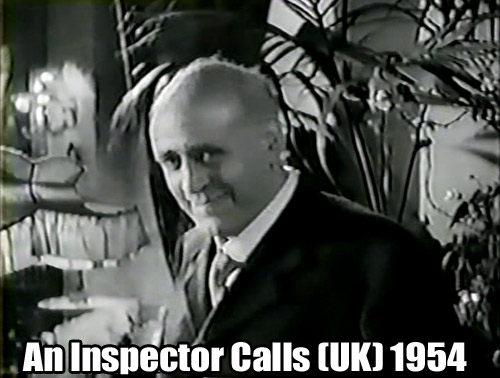 |
An Inspector Calls (UK) 1954 If Alistair Sim were to have a show where he ate a barrel-load of bangers and beans, I’d buy a ticket. Sim has been a favorite of mine since seeing “A Christmas Carol” as a child and I’ve probably seen it over 100 times since. This film is based on a play written by J.B. Priestley (and adapted by Desmond Davis) and while the action is contained, it doesn’t get stagy under Guy Hamilton’s direction. An upper-middle class family is at home when a police inspector calls making inquiries about a young woman who has committed suicide and who once worked for the father of the family at his family. Slowly it emerges that others in the family may have known her as well. Sim saves this class-conscious whodunit (of sorts) and he keeps you watching until the clever twist ending. With Jane Wenham, Brian Worth, Eileen Moore, Olga Lindo, and Arthur Young, among others. |
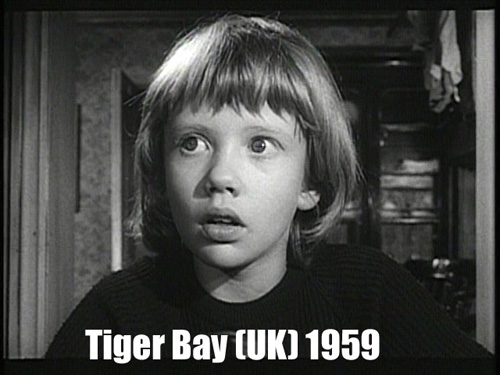 |
Tiger Bay (UK) 1959 Shot on mostly on location in the Tiger Bay section of Cardiff, this offbeat crime drama is about an 11-year-old girl – with a tendency to lie – who witnesses a murder and then befriends and protects the killer. Starring John Mills and his daughter Haley (in her first major role) as well as Horst Buchholz, Yvonne Mitchell and Megs Jenkins, among others, and directed by J. Lee Thompson who would go on to direct the original “Cape Fear.” Unpredictable – in the small unexpected ways that matter – and considered by some to be a forerunner (of sorts) of the kitchen sink films. Although the film is devoid of any sexual innuendo whatsoever, it’s highly unlikely that this film would be made these days. One thing I love about Brit cinema of this time frame is that would pursue stories based on the characters and in this case the characters are quite complicated. |
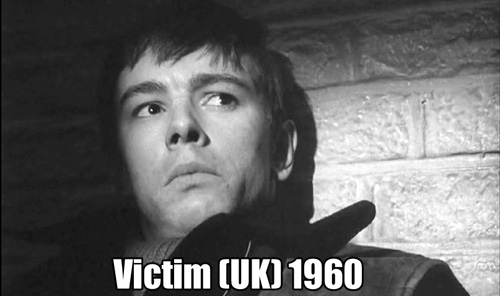 |
Victim (UK) 1961 This film has the distinction of being the first English language film to use the word “homosexual.” Germany was way ahead of the curve when censorship was ended for a while after WWI and numerous “sex education” films were released including Richard Oswald’s “Different from the Others” in 1919. The story is of an up-and-coming lawyer Melville Farr (Dirk Bogarde) and the web of blackmail among his gay friends that he discovers when he is dragged into the case. One young man is stealing from his employer to pay the blackmailer and ends up hanging himself in his jail cell when arrested for the theft. That man had admired Farr and the police are interested in why the young man had a scrapbook of the lawyer in his room. In a lot of ways, this film has the feel of an espionage story and while it is obviously slanted toward changing the laws regarding homosexuality in England, it stops short of being a heavy-handed message film and instead leans toward intelligent and respectful. Directed by Basil Dearden (“The Gentle Gunman,” “Khartoum”), the film also stars Sylvia Syms, Dennis Price, Nigel Stock, and numerous other Brit character actors. Nicely paced and well shot by Otto Heller (“Lady Killers,” “Peeping Tom”). |
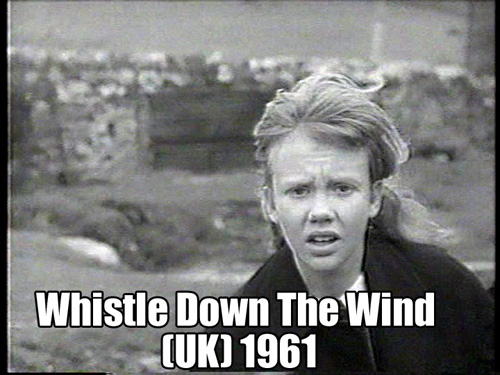 |
Whistle Down The Wind (UK) 1961 A tad too sweet for my cuppa, yet the film never degenerates into treacle and that’s what kept me watching. Recently, I’ve been on a sort of Brit flicks from the ‘60s binge and more and more I’m coming to appreciate that they are a great bunch of films. This film is about a group of children who come to believe that the bearded man hiding in the barn is Jesus. They keep him a secret from the adults (and the police who are looking for a man wanted for murder) as they visit him with food stolen from their own dinner tables. It’s a really well done film about belief and trust. With Haley Mills (right after “The Parent Trap” and an early appearance by Alan Bates. Directed by Bryan Forbes and also starring, Bernard Lee, Norman Bird and Diane Clare, among others. |
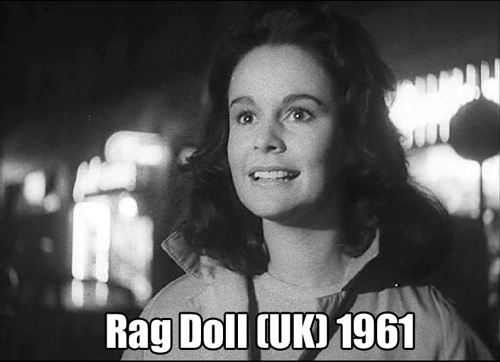 |
Rag Doll (UK) 1961 Some consider this a cult film but I see it as a film that survives against the odds. 17-year-old Carol (Christina Gregg) runs away from home, her café job and her alcoholic step-father (Patrick Magee) to go to London where she gets a job in a restaurant after having met a fortune teller (Hermione Baddeley) who tries to set her straight. Advice is wasted on the young and she becomes involved with a pop singer who has a sideline in crime. The chances of this ending well are nil. Nice gritty Brit cinematography and location shooting and some decent work by the actors who avoid any sort of histrionics. Interesting thing about Brit films is that the "bad" girls look and dress just like the "good" girls. Hollywood even moralizes through fashion and what’s really satisfying about this series of films is how underplayed and day-to-day it all seems. They’re not about the fetishism of morality. Directed by Lance Comfort and with cinematography by Basil Emmott, it also stars Jess Conrad, and Kenneth Griffith, among others. |